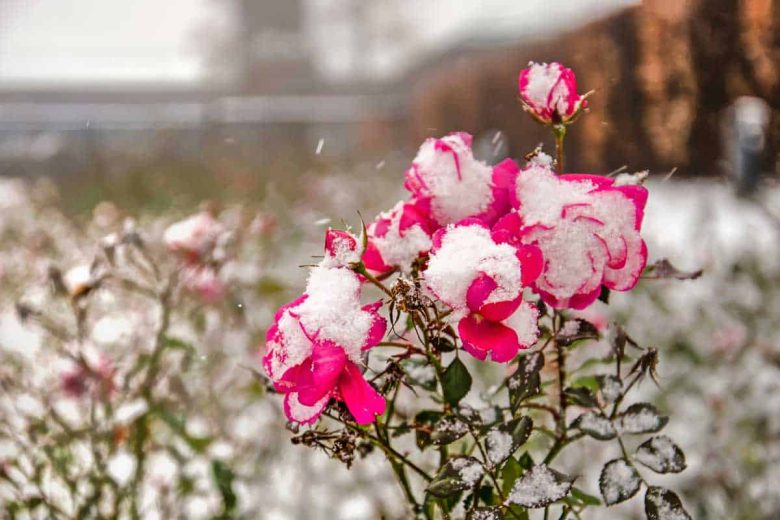As the bright colors of summer fade, it’s time to prepare your cherished rose garden for the cold winter months. Properly winterizing your rose garden is critical to ensuring that your roses thrive and bloom beautifully in the spring. In this guide we give you valuable advice to keep your roses healthy during the colder months.
1. Pruning and Cleaning: Before the first frost sets in, prune your roses to about half their height. Remove any dead or diseased branches, as they can harbor pests and disease in winter. Remove fallen leaves and debris from around the plants to prevent mold growth.
2. Mulch: Placing a layer of mulch around the base of your rose bushes can help protect them from freezing temperatures. Use organic materials such as straw, wood chips or compost. Apply a thick layer about 4-6 inches deep to properly protect the soil and roots from extreme cold.
3. Watering: Proper moisture is essential for roses in winter. Water the plants well before the ground freezes. But be careful not to overwater, as soggy soil can cause root rot. Monitor soil moisture and water sparingly as needed.
4. Wrap: For added protection, consider wrapping your rose bush in burlap or other breathable material. This protects them from strong winds and prevents the trekking poles from breaking due to snow.
5. Potted Roses: If you have potted roses, move them to a sheltered spot like a garage or shed. Provide adequate light and ventilation, but keep them out of the freezing cold.
6. Pest Control: Before winter sets in, check your rose plants for signs of pests. During dormancy, treat them with an appropriate insecticide or insecticidal soap to prevent infection.
7. Disease Prevention: Prevent the spread of disease by removing infected leaves or branches from rose bushes. Use fungicides to prevent fungal diseases that grow in wet and cold conditions.
8. Check and Adjust: Check your roses occasionally throughout the winter to make sure the mulch is intact, the film is tight, and the plant remains healthy. If you notice any problems, adjust them.
9. Soil Care: During the winter months, your rose plants may experience temperature fluctuations that cause the soil to bulge. To avoid this, lightly press down on the soil around the base of the plant each time you inspect the plant. This will help stabilize the roots and protect them from exposure.
10. Consider using an anti-desiccant: An anti-desiccant spray can be sprayed on the leaves of your rose bushes to reduce water loss. These sprays create a thin protective layer that minimizes water loss from the leaves and helps keep roses hydrated even in dry winter winds.
11. Maintain Equipment: Winter is an excellent time to clean and sharpen your garden tools. Pruners, loppers and other equipment should be well cleaned and oiled to ensure they are ready to use when the growing season returns.
12. Enjoy Winter Blooms: Certain rose varieties are known for their ability to bloom in mild winters. These winter-blooming roses can add a splash of color to your garden when most other plants are dormant. Research and choose the right varieties to brighten up your winter landscape.
Conclusion
In short, the frost protection process is an important investment in the health and vitality of your rose garden. By following these expert tips closely, you can protect your beloved plants from harsh weather conditions, ensure they can survive the colder months and pave the way for brilliant spring blooms. When you prune, mulch, wrap and care for your roses, you are not only preserving their beauty, but also cultivating a deeper connection to the natural world. The patience and dedication you show in winter will be richly rewarded when your garden awakens in color and fragrance, a testament to your commitment as a dedicated gardener. So enjoy the winter getaway, cultivate your roses and look forward to the awe-inspiring spectacle that awaits you in the vibrant tapestry of next spring.
FAQs
1. Why is frost protection important for my rose garden?
Freeze protection helps protect your rose plants from freezing temperatures, high winds and potential disease. Proper preparation ensures that they are healthy and vibrant in the spring.
2. When should I start winterizing my rose garden?
Start the frost protection before the first night frost arrives. This usually means starting around late fall, October or November, depending on your region.
3. How should I prune rose bushes in winter?
Cut the rose back to about half its height and remove any dead or diseased branches. This helps prevent damage from heavy snow and encourages new growth in the spring.
4. What type of mulch should I use and how much?
Use organic materials such as straw, wood chips or compost. Apply a layer about 4-6 inches deep around the base of the rose bush to insulate the soil and roots.
5. Do roses need to be watered in winter?
Water roses thoroughly before the ground freezes, but avoid overwatering to prevent root rot. Monitor soil moisture and water sparingly as needed.



